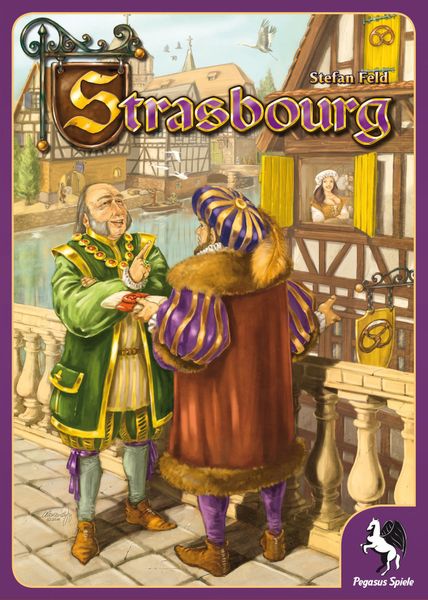Strasbourg (2011) Board Game
Strasbourg is a board game released in 2011 that revolves around city building and economic strategies set in a medieval backdrop. Designed by Alexander Jung and Hans-Georg Schneider, the game challenges 3-5 players to compete in securing influence and resources to develop the city of Strasbourg.
Game Components of Strasbourg
How To Setup Strasbourg
To set up the game, place the game board on the table and shuffle the five Round cards, placing them face up in their marked spots. Shuffle the Edifice tiles and place one at the bottom of each Round card. Each player selects a color, takes the matching components, a Player screen, and five coins. Players place their Prestige markers on the 0 space of the Prestige Path. A starting player is chosen, placing one of their Family Members in the Nobility’s Seat of the Council, and the next player places one in the Church’s Seat. The other Council seats remain unoccupied. Each player receives five random Task cards, which they can choose to keep or return to the box.
Gameplay Mechanics and Game Objective
Player Experience
Strasbourg offers an engaging mix of strategy and historical context, challenging players to make savvy decisions and predict competitors’ moves. The game is easy to learn but provides deep strategic possibilities, making it appealing for both casual gamers and those who enjoy complex strategic planning. Players must navigate the intricate social and political networks of 15th-century Strasbourg, ensuring each playthrough is unique and challenging.
Pros
Cons
Personal Thoughts on Strasbourg
Strasbourg is ideal for fans of strategic games who appreciate historical settings and complex social dynamics. It is particularly suited for groups of three to five players, offering a unique blend of influence management and competitive strategy. Despite its lack of traction compared to some of Feld’s other games, Strasbourg remains a structurally sound and engaging game that rewards careful planning and strategic thinking. For those who enjoy games like *The Castles of Burgundy* and *Trajan*, Strasbourg is definitely worth exploring.
We are supported by our audience. When you purchase through links on our site, we may earn an affiliate commission, at no extra cost for you. Learn more.

